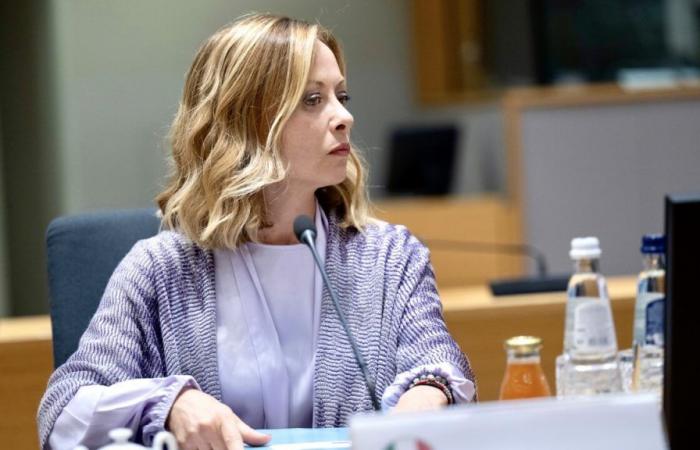In the end, the line dictated by the majority prevailed: during the summit which ended on Thursday night in Brussels, the leaders of the European Union agreed to grant a second mandate to the German Ursula von der Leyen at the helm of the Commission. With her, to complete the picture of top jobthe highest offices of the EU institutions, there are the Portuguese Antonio Costa as President of the Council and the Estonian Kaja Kallas who will be High Representative for Foreign Policy. Giorgia Meloni, for the moment, has had to accept the choices made 48 hours before the summit by what she defined as an “oligarchy”, that is, the restricted summit of the heads of state and government of six countries (Germany, France, Spain, the Netherlands, Poland and Greece), representing the three majority forces in the European Parliament (popular EPP, socialists PSE, and liberals Renew).
Meloni’s isolation
The exclusion of Meloni from the negotiations had been requested by socialists and liberals, who placed as a fundamental condition for the reconfirmation of von der Leyen, who is part of the EPP, the halt to any agreement between the People’s Party and the conservatives of the ECR, the party European led by the prime minister. The People’s Party tried to mediate until the end, with the party leader, Manfred Weber, and the influential Polish Prime Minister Donald Tusk publicly supporting the need to obtain Italy’s support for the appointments and to respect the “interests ” of “a G7 country, leader in the EU”. Behind this mediation work there was undoubtedly the hand of Foreign Minister Antonio Tajani, a leading exponent of the EPP, as well as former president of Parliament and vice-president of the Commission.
The door opens to von der Leyen
It is not clear whether the bridge builders calmed Meloni’s anger or not. What is certain is that, at the end of the summit, Meloni could not help but follow the path leaked by her entourage the day before: she abstained on the election of von der Leyen, and voted against Costa and Kallas. Of the 27 EU leaders, only Hungary’s Viktor Orban did not give his full consent to the trio of nominations, while the other conservative prime minister (and therefore Meloni’s ally), Czech Petr Fiala, voted in favor. The right-wing axis, therefore, did not work, at least in the Council.
“The proposal formulated by the Popular, Socialists and Liberals for the new European leaders is wrong in its method and substance. I have decided not to support it out of respect for the citizens and the indications that those citizens have received with the elections”, wrote the Prime Minister on X on the sidelines of the summit. However, the abstention on von der Leyen seems to be a door left open to the current head of the EU executive: “The issue is not Ursula von Leyen but what policies she wants to carry forward. And on this we have no answers”, explained Meloni, adding however that she is sure that Italy “will be recognized for what it deserves”, that is, a vice-presidency of the Commission, or a heavy portfolio covering the sectors of industry and agriculture.
The race for the weight chair
To achieve this, the prime minister will most likely use the ECR weapon in the Strasbourg Parliament: the conservatives have emerged strengthened from the European polls, at least for now. The ECR group currently has 83 deputies, and is the third force in the European Parliament (even if the 20 Poles of the PiS have made it known that they could leave). To be confirmed, von der Leyen will need the support of the majority of the Chamber, that is, at least 361 votes.
The Popular, Socialists and Liberals together have 399 deputies. On paper, the numbers are there, but not all the deputies of the majority will support the German leader’s encore: the snipers could be around forty, according to the calculations circulating in Brussels. This is why the support of the conservative parliamentarians could be decisive, even if only from the 24 deputies of Fratelli d’Italia. Meloni will try to leverage this, but she must also take into account the aims of the other leaders, starting with the French Emmanuel Macron, who seems to want to aim for the same seats requested by Italy. Furthermore, the conservatives’ aid could be thwarted (or scaled down) by an agreement between von der Leyen and the Greens, who can assure her 54 votes.
Parliament’s vote of confidence
The real game for the prime minister (but also for the president of the Commission), therefore, begins now. Von der Leyen will begin her negotiations with the leaders of the political groups next week, which should last three weeks (the vote in Parliament is expected for July 18, unless postponed). “It is very important for me to work in the Council with Italy, with all the other states, it is a principle that I have always followed”, said the German leader, adding that she will seek confidence also outside the majority, working with the “national delegations” of the groups, that is, the individual parties such as FdI.
If von der Leyen manages to win the confidence vote, she will consult again with the leaders of the 27 to form the team of commissioners and define the portfolios. Once the team is in place, the nominations will have to go through a vote of confidence in the Parliament again, most likely in September. However, if the current Commission president does not obtain the support of the majority of MEPs, then the heads of state and government will have to find a replacement in midsummer. If this were to happen, it would be a first in the history of the EU.






